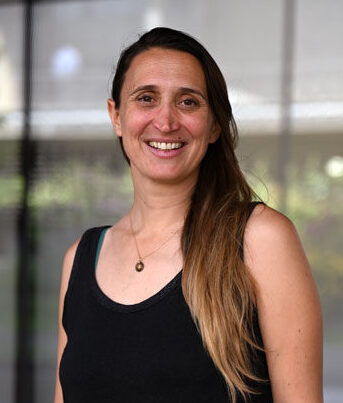
Interview: Anne Laure Dinel

Anne-Laure Dinel heads up NutriBrain, a technology transfer unit supported by the Nouvelle-Aquitaine region and supported by ADERA. Backed by the NutriNeuro laboratory, this unit aims at highlighting the impact of nutrition on “cerebral well-being”.
Bordeaux Neurocampus : How did you come to work at NutriBrain ?
Anne-Laure Dinel : After training as a food engineer, I completed a thesis in a nutrition laboratory on the impact of obesity on depression.
During this thesis, I was able to deepen the link between fundamental and applied research with industrial partners.
Then, after a post-doctorate in Toulouse, I returned to the same laboratory, now called NutriNeuro. I then worked on a first contract between the laboratory and an industrial partner, formalized around a research collaboration.
Following this experience, we decided, with the staff of NutriNeuro, to set up this NutriBrain unit. The goal is to promote the laboratory’s expertise to industrial partners in the dietary supplements and pharmaceutical sectors, offering them the opportunity to objectify the impact of their products on what we might call cerebral “well-being”.
The transfer unit is a very unique system, specific to the Nouvelle-Aquitaine region. How is it structured?
It is a private entity backed by the NutriNeuro research laboratory and supported by ADERA, a subsidiary of several public establishments including the University of Bordeaux and Bordeaux INP.
It’s a real win-win situation, since the NutriBrain unit benefits from ADERA’s administrative support and NutriNeuro’s expertise and equipment, while at the same time structuring and organizing the laboratory’s partnership research and creating an entry point for the development of new collaborations. As head of the unit, I set up research projects like any other researcher, but only with industrial partners.
How do these collaborations between the unit, the laboratory and the industry partner work?
It’s not the role of the transfer unit to carry out collaboration contracts; it’s just a service provider. However, it is there to help structure these contracts, which are supported by the laboratory. This is why we collaborate on the SilverBrainFood project, which is a PSPC type contract (‘structuring project for research and development for competitiveness’), supported by Bpifrance, and whose aim is to promote partnerships between industry and academia.In this project, we have two academic partners, the NutriNeuro laboratory and BPH – Bordeaux Health Center, and industrial partners including Activ’Inside.
Similarly, we have just been awarded a PIA4 (call for projects “Food needs of tomorrow”) with several industrial partners, Abyss Ingredients, NutriDry and Seprosys, as well as an academic partner, LIENSs in La Rochelle.
In both cases, the NutriBrain transfer unit and the NutriNeuro laboratory build the projects from a scientific and technical point of view, NutriBrain helps to structure them through its expertise in industrial collaborations, NutriNeuro carries out the collaboration and Bpifrance and the industrial partners finance it.
What types of studies do you offer your industrial partners?
We have a strong expertise in brain health, cognitive trajectory and the way in which nutrition can modulate cognitive abilities over the course of an individual’s life, or have an impact on anxiety and depression.
We offer our partners preclinical cell culture models and preclinical in vivo models, in which cognitive and emotional behaviors are assessed in mice after supplementation. When we have sufficient evidence of efficacy, we can decide with the industrial partner to set up a clinical study.
It is very important for us to offer our expertise to industry. For a long time, the dietary supplement sector was criticized for marketing products with no real effect, and for misleading consumers.
Now, industrials have a different approach. Competition is fierce, and they have a duty to provide proof of the health benefits of their products. So there’s a real need for scientific research into the efficacy of their nutrients, as well as an understanding of their mechanisms of action.
Moreover, we have to be able to popularize the results obtained with our private partners. We also support them in communicating the results, and make sure that they are reported, without excess, so as to remain strictly scientific.
Do you apply the same communication expertise to reach a wider audience on these issues of brain well and nutrition?
Our primary objective is to popularize our research and results with our industrial partners.
But ultimately, we often work on public health issues, such as cognitive health in aging and depression. So communicating with the general public is also an important objective for the NutriNeuro laboratory and the NutriBrain unit.
Nutritional education is absolutely essential if we are to change certain habits. We know, for example, that nutrition plays a major role in the increase in overweight and obesity in our society. We also know from studies, some of which have been carried out at the NutriNeuro laboratory, that nutrition through Mediterranean diet and diets rich in omega 3 or polyphenols can help prevent age-related cognitive decline and neurodegenerative pathologies.
We see it as a major public health challenge to develop and implement strategies to prevent cognitive decline, whether physiologic or pathological, as well as anxiety and depressive disorders.
Last update 30/08/23
